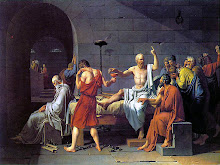
If someone in the street stopped you and prayed for you to be washed in the blood of the lamb, you may feel a little uneasy, even if you are not a vegetarian.
Not that this would comfort you, but it’s Biblical, from Hebrews 19:
“If the blood of bulls and goats, and the ashes of a heifer sprinkling the unclean sanctifies to the purifying of the flesh: How much more shall the blood of Christ, who through the eternal Spirit offered himself without spot to God, purge your conscience from dead works to serve the living God?”
There is a cultural problem with religious language - it gets trapped in time and space - usually someone else's.
Because on an average day, the average person where I live does many odd things, but they don’t sacrifice and burn bulls or goats and sprinkle themselves with the ashes to get clean.
A shower usually suffices quite well for that.
The Bible can be culturally inappropriate.
But remembering we are dust and to dust we return is always a relevant human experience.
If you've ever seen a cremated body you'll know what it means to say we are dust, give or take a knee joint.
And this is why people put ash on their heads. Ash Wednesday reminds us to turn to a higher Being than the dust.
Archaeologists say that about 40,000 years ago something really radical happened to us homo sapiens. We started to make things of beauty – and not just tools. We started painting and talking and making music. And we started burying each other, with flowers and gifts, and possibly also with a belief in the afterlife.
But there's a second cultural problem with the word "after" as in afterlife. It implies durational time, and life beyond dust is non-durational, it is eternity, it is spiritual.
It is beneath the appearances of dust and space and time. It is beyond our understanding of nature, and therefore it is even supernatural.
But we don’t need to use that word.
Consider the voice the Bible says spoke to Moses from a burning bush.
It said: ‘I am that I am’.
This reminds us of an even more peculiar word than supernatural.
The word: ‘I’.
What is I?
I does not identify any material object in the world in which we are situated, nor any object out of that world.
What is it to look into someone’s eye and see the other eye look out at you?
It is an experience called Transcendence - it is metaphysically obscure and unintelligible.
But we are faced with this experience every single day, and so religion makes sense of it for us.
The Christian religion trusts in Jesus as the sensible image of this unintelligible eternity and mysterious spirituality.
But even for those who don’t have Jesus, or any religion at all, this unseen experience of I is always still there, because it is only the dust we can see physically.
Which is why, in the Bible, after his suffering and questioning of God is over, Job says: “I abhor my words and repent, seeing that I am dust and ashes.”
A human life is just like this.
It is all our experience to recognize that our lives are contingent on mysterious Being, Being greater than our own personal lifespan.
We Christians may trust in the particular and perculiar qualities of Jesus, but St Thomas Aquinas, the most famous Catholic theologian, said God cannot be a person - or a substance - or a thing - or even a being at all, because God IS Being.
Being is intelligent and conscious, but it does not need a skull and a forehead which turn to dust.
In our culture we may not sacrifice animals or dress in sackcloth and pour ashes on our heads – but we are dust… and to dust we return, and really knowing this in our experience will open us up to Being.
Being, not dust, and Being has persisted in us ever since we began.
And God is Being, the origin of all dust, space and time.
Acknowledging this is called repentance because it turns us to God, and opens us, and can fill us.
So permit me to use some religious language - for I acknowledge a Creator beyond us, as much creator of now as any other time, a Redeemer within us, as real as anything else within us, and a Spirit between us.
In the name of Father, Son, and Holy Spirit, one Lord Jesus Christ. Amen.




















































































